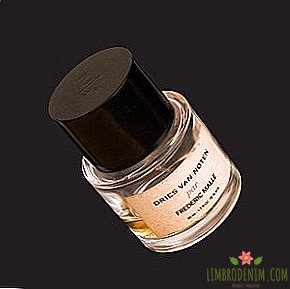Sommelier Natalia Puzdyreva on how to do wine seriously
IN RUBRIC "BUSINESS" we introduce readers to women of different professions and hobbies that we like or are simply interested in. This time we talked with Natalia Puzdyreva, a certified sommelier who has mastered a business that is still dominated by men, and where women are trying to break through. In the new international ranking of the best, the third and fourth positions were taken by the Irish and Argentine, but few understand the true value of this position. Natalya Puzdyreva told us what the sommelier really was behind the work, how the study in Argentina was going on and why the final exam was taken in four languages.
How to exchange a psychology diploma for a sommelier certificate
When in 2013, after a long journey through Latin America, my young man and I did not return to St. Petersburg and stayed in Argentina, I decided not to confirm the Russian diploma in social psychology and not to look for vacancies in Eichar as before. I wanted more big changes and completely different from my old life. It was the perfect moment for me to turn my long-term passion into a new profession. Of all the cities for life, we chose Mendoza - the Argentine capital of wine, where I entered the EAS - the Argentine Sommelier School, the best specialized educational institution on the continent. The program is designed for two years. The school is attached directly to two universities: the Argentine University of Aconcagua and the Spanish University of Barcelona - so after graduation you will receive two state international diplomas. Education is paid; in two years comes out about six thousand dollars. There are no entrance exams, to which we are accustomed to in Russia, there is no: you sign up, pay for semester and go to pairs.
At first there were forty people in our group. Mostly yesterday's schoolchildren and people age 45+. The first rejoiced that only two years before the diploma, not five; the latter hoped to easily combine regular work with study. We all dreamed of how we would taste the expensive wines all day long, have a snack on their exquisite cheeses and expertly talk about fruit and berry components, bright aromas and an unforgettable aftertaste. And great mistake. In practice, everything turned out differently: no less interesting, but ten times more complicated. Of the forty who received the final international certification, only five people passed, I am among them.
Hungarian wine and exam in four languages
In the first semester, we were plunged into oenology: we studied in detail the types and stages of wine production, delved into the fermentation process, studied temperature zones, types of soil and yeast. At the same time, we were explained the basic formulas for calculating the sugar content and acidity. After a couple of months, our rented apartment began to "overgrow" with maps. About each wine-making country of the Old and New World was told separately and in great detail, by region. I infinitely wondered geography, to vertigo I memorized the names of rivers, mountains, glaciers, soils, wineries, the names of famous enologists and sommeliers. In parallel with this, there was information on diseases that affect vineyards, data on major epidemics, record harvests and a detailed review of brands and labels.
In addition to wine, we studied strong alcoholic drinks, liqueurs, beer, cigars, tea and coffee. The hardest thing was Eastern European winemaking with Hungarian, Slovenian and Romanian names that I could not remember. In addition to enology and geography, there were also service seminars. They told us how to properly open the wine, when it is necessary to wipe the neck, how to present the label and properly hold the decanter. For the sake of practice, I worked for free at all sorts of wine tastings and ferries - street fairs, which are a million in Mendoza.
The final exam consisted of three parts. It was taken by the headmaster of the school and one famous Spanish oenologist. In the first round, you answer theoretical questions throughout the course. In the second, you taste wine and draw up its technical description, determining the origin, variety, age, storage potential, approximate cost and compatibility with food. For the third round you are preparing a virtual restaurant project and fully develop a menu for it. The examiners seem to come to you for lunch or dinner and ask a million questions from the series “advise us, please, wine that is ideal for both grilled fish and steak with blood.” As a "dessert", you demonstrate commissioning skills to the service, as well as taste and verbally describe one of the wines. At the exam, in addition to Spanish, you need to speak at least one other language. In my case it was English, French and Russian.
About snobbery, alcoholism and discrimination
For two years at school sommelier my attitude to wine has changed globally several times. From naive enthusiasm, I turned to freshman snobbery, and by the end of my training I realized that it was most important to combine the drink with food correctly. I love to look for something new in wine shops and I can pay a lot for the bottle I liked. People often ask me if I’m not afraid of becoming an alcoholic - no, not at all. Because every time I uncork a cork for the sake of a new gastronomic experience, and not to achieve an alcoholic effect. I had a handbook on wine, and one of my favorite films was “Shock Effect” (“Bottle Shock”, 2008). He tells the real story of 1976, when a small California winery won the competition in France. It was the first triumph of the New World in a conservative Europe.
The world of wine is small and very closed, everyone knows each other, and the personal recommendation of a respected expert is invaluable. But every year in the profession becomes more women. This is explained by the general world trend, and also by the fact that, as it seems to me, modern girls are often more purposeful than boys — we are ready for difficulties and are able to learn. The only opportunity to become part of a wine society for foreigners without connections is to work a lot for free on thematic events, which I did in Mendoza in parallel with my studies. My perseverance and professionalism was appreciated, useful contacts appeared. Thanks to them, I rather quickly found a job in Santiago, the capital of Chile, where we moved a few months ago.
Job for owls and fake specialists
Sommelier - the perfect specialty for owls. My work day rarely begins before five in the evening and ends around midnight. First, in a specialized wine shop, I help customers choose the right wine as a gift, for dinner, a picnic or a romantic date, and then I give recommendations on wine to restaurant visitors. I work in the center of the city, and there are many foreigners among the clients, so for my chefs it is crucial that I speak several languages fluently and easily cope with the service. As a part-time job, I am often invited to advise hotel staff on wine lists.
A separate topic in my profession is the crowd of fake sommeliers. At most, they finished some bartenders' courses or listened to two-week introductory lectures, after which they imagined they were great specialists. Such people I meet very often. Unfortunately, they devalue the profession, but I try to treat such characters philosophically: they can open their own wine-shops, agencies, hold tastings, but they can only fool those who understand little about wine. Their business, even a very successful one, is a stall selling Chinese fakes of famous brands. I'm not on the road with them.
I am currently preparing for The Court of Master Sommeliers exam for a second-level certificate. The profession of a sommelier is good because you can always grow in it, earn extra points and qualify for new heights. The palette of smells, textures and tastes is endless. In the future I want to try my hand in Europe, and then I dream to open my own business, a restaurant or a wine bar, together with my young man - he is a chef by profession.




